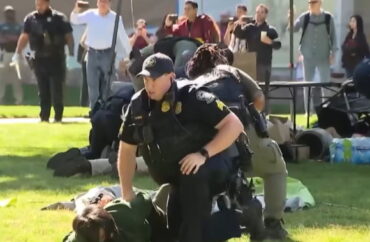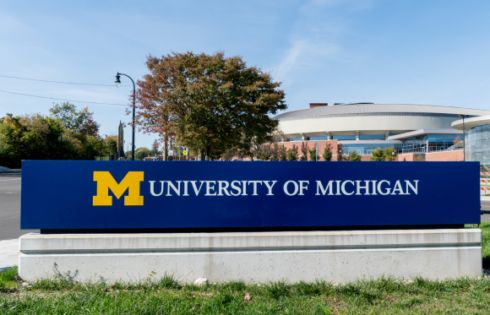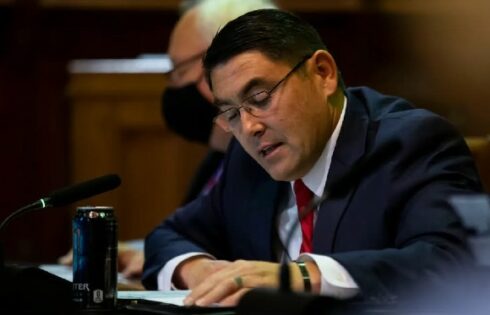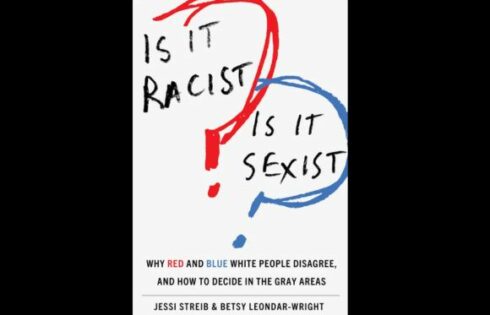
Nearly 300 aggressive pro-Palestinian protesters who refused repeated orders to disperse from quad occupations on more than a half-dozen campuses were arrested this week in clashes with police that sometimes resulted in the use of pepper spray to quell demonstrators who fought back against officials’ repeated demands to vacate the encampments.
Since Saturday, violent clashes with officers have unfolded at the University of Virginia, University of Pennsylvania, Massachusetts Institute of Technology, University of Arizona, George Washington University, University of Massachusetts Amherst, University of California San Diego, and the University of North Carolina at Charlotte, resulting in at least 296 arrests, according to various news reports.
More than 30 pro-Palestinian protesters at the University of Pennsylvania were arrested Friday morning after refusing to disperse, NBC Philadelphia reported. Journalists from the news station observed dozens of police officers, some of whom donned tactical gear, move in on the encampment before sunrise.
“While some of the protesters left, dozens remained in front of the Ben Franklin statue on Penn’s college green, refusing to move while chanting and linking arms,” the news station reported. “About three dozen students remained around the Ben Franklin statue and refused to leave. Police then moved in and removed them one at a time, some screamed and chanted as they were led away.”
At MIT, an encampment that began April 21 was finally shut down Thursday by police after protestors escalated the occupation tactics. An email to the campus community from MIT President Sally Kornbluth explained what led up to Thursday’s nine arrests:
On Monday, May 6, judging that we could not sustain the extraordinary level of effort required to keep the encampment and the campus community safe, we directed the encamped students to leave the site voluntarily or face clear disciplinary consequences. Some left. Some stayed inside, while others chose to step just outside the camp and protest. Some chose to invite to the encampment large numbers of individuals from outside MIT, including dozens of minors, who arrived in response to social media posts.
Late that afternoon, aided by people from outside MIT, many of the encampment students breached and forcibly knocked down the safety fencing and demolished most of it, on their way to reestablishing the camp. In that moment, the peaceful nature of the encampment shifted. Disciplinary measures were not sufficient to end it nor to deter students from quickly reestablishing it.
Wednesday, May 8, was marked by a series of escalating provocations. In the morning, pro-Palestinian supporters physically blocked the entrance and exit to the Stata Center garage though they eventually dispersed. Later, after taking down Israeli and American flags that had been hung by counter protestors, some individuals defaced Israeli flags with red handprints, in the presence of Israeli students and faculty. Several pro-Israel supporters then entered the camp to confront and shout at the protestors. Throughout, the opposing groups grew in numbers. With so many opposing individuals in close quarters, tensions ran very high. The day ended with more suspensions – and a rally by the pro-Palestinian students.
Thursday, May 9, pro-Palestinian students again blocked the mouth of the Stata garage, preventing community members from entering and exiting to go about their business, and requiring that Vassar Street be shut down. This time, they refused directions from the police to leave and allow passage of cars. Their action therefore resulted in nine arrests.
Also on Thursday, police used “chemical irritants and rubber bullets to break up a gathering of about 100 protesters” at the University of Arizona, the Arizona Republic reported. Although the campus was already the site of an encampment-occupation that was aggressively shut down by police May 1, activists were back at it.
Late Thursday, officers “in riot gear lined up across from the encampment, inching forward and telling the crowd to leave. They threatened to use tear gas, pepper spray and pepper-spray balls on the remaining protesters. At that point, UA administration had given those in the encampment at least two warnings to disperse,” the Arizona Republic reported, adding:
Within minutes, protesters began throwing barricades, orange cones and their own tents and gear in front of the large trucks. The protesters eventually poured onto the street, facing off in front of officers, trying to stop them from advancing.
Shortly after midnight, the sound of projectiles being launched filled the streets in front of the university. Officers also deployed gas canisters, clearing the encampment and moving the protesters down University Avenue away from campus. Observers said they saw law enforcement deploy rubber bullets.
At least two people were reportedly arrested as a result of Thursday’s operation at UA.
On Wednesday, a two-week-old encampment at George Washington University in Washington D.C. was shut down by police in another aggressive confrontation that led to officers arresting 33 protesters at the University Yard, the GW Hatchet reported.
“Police surrounded U-Yard from every side when they delivered their first of three warnings to protesters at about 3:24 a.m. to leave the encampment,” the student newspaper reported, adding many activists chose to leave at that time, but others remained.
“At about 4:13 a.m., a group of roughly 30 protesters raced to an area near the intersection of Pennsylvania Avenue and 20th Street, where police were blocking further access to 20th Street. Protesters pushed against the barricade police formed with their bikes, and officers brandished their batons and began pepper spraying protesters after a few minutes of struggle,” the newspaper reported.
The Associated Press reported that “Mayor Muriel Bowser, a Democrat, said she and Metropolitan Police Chief Pamela Smith decided to clear the camp because of signs that ‘the protest was becoming more volatile and less stable.’ Among them were indications that protesters had ‘gathered improvised weapons’ and were ‘casing’ university buildings with the possible intention of occupying them, police said.”
A pro-Palestinian encampment at the University of Virginia was shut down on Saturday, ending “with officers deploying pepper spray and arresting 27 protesters,” Inside Higher Ed reported, adding the enforcement is under scrutiny.
“Administrators sought to explain their rationale in a virtual Town Hall on Monday, arguing that the protesters’ chants and provocative language—as well as the alleged presence of potentially dangerous individuals unaffiliated with the university—all factored into their decision to call in the Virginia State Police, which responded in riot gear and forcefully cleared the encampment. But video and eyewitness testimony has since cast doubt on the university’s official explanation,” IHE reported.
Campus leaders said things were tense and potentially explosive at UVA, however, IHE reported:
At Monday’s virtual town hall, [President James] Ryan and other senior administrators argued that they had become worried about the growth of the encampment, the alleged presence of four men in tactical gear—two of whom were known to law enforcement for committing violent acts— and accounts of aggression by demonstrators.
Tim Longo, associate Vice President for Safety and Security and Chief of Police, said he was afraid he would be encircled by protesters who he said chanted at him and used umbrellas “aggressively” as he told them to remove tents from the site on Saturday.
“I was in fear when that group surrounded the encampment, opened up the umbrellas and used words such as ‘Fight, win, nothing to lose, at all costs.’ I was afraid, at the time, that myself and the assistant chief and the Student Affairs colleague that was there would be surrounded and that we would be put in a position to have to defend ourselves,” Longo said at the town hall.
At the University of Massachusetts Amherst on Tuesday, police in riot gear arrested about 130 pro-Palestinian protesters who refused to disperse and break down their encampment occupation despite repeated requests to do so.
“Video of the camp clearing depicts rough handling of protesters by police, many of whom were in riot gear,” Mass Live reported.
UMass Amherst Chancellor Javier Reyes, who is now facing calls for his resignation, released a statement in which he lamented the enforcement.
“Safety, wellbeing, and a sense of belonging are paramount for our community’s ability to thrive, and I recognize that there is work to do as we restore trust with those who feel harmed by the university’s actions. I have also asked my colleagues on the Community, Democracy and Dialogue initiative to help chart a course forward through these contentious issues. My greatest hope is to continue dialogue, even – and especially – with those who disagree with or question the university’s stances and actions,” Reyes stated.
Also at the UNC Charlotte on Tuesday, at least one activist was arrested as police tore down a campus encampment, Queen City News reported.
On Monday, 64 pro-Palestinian activists who refused to disperse were arrested at the University of California San Diego during a raid that at times turned violent as protesters and police clashed, according to local news reports and social media posts. Some students and ethnic studies faculty are now calling on UCSD Chancellor Pradeep Khosla to resign.
Not all occupations have ended in clashes with police and arrests, however: “Pro-Palestine students who took over a Rhode Island School of Design building ended their four-day occupation Thursday after President Crystal Williams threatened them with expulsion,” the Providence Journal reported Thursday.
MORE: Pro-Palestinian GWU student ‘tribunal’ calls for campus leaders to be beheaded on guillotines
IMAGE: X screenshot
Like The College Fix on Facebook / Follow us on Twitter






Please join the conversation about our stories on Facebook, Twitter, Instagram, Reddit, MeWe, Rumble, Gab, Minds and Gettr.